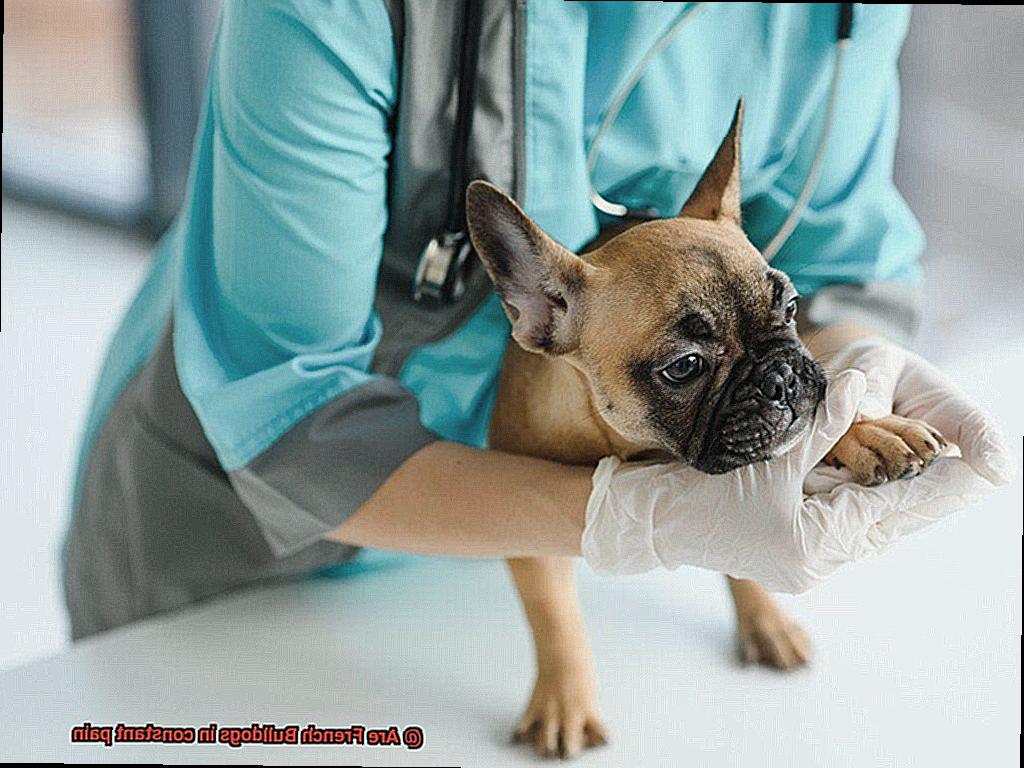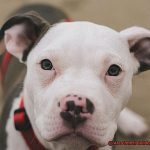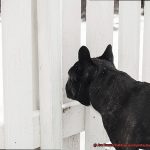Understanding IVDD in French Bulldogs:
Susceptibility: French Bulldogs have a compact body with a longer back, which places increased strain on their spine. Additionally, genetic predisposition to intervertebral disc degeneration makes them more prone to developing IVDD.
Recognizing the Symptoms:
- Back pain: Watch out for signs of discomfort, such as reluctance to jump or climb stairs.
- Mobility issues: Difficulty walking or standing, muscle weakness, and changes in gait may indicate IVDD.
- Serious signs: In severe cases, loss of bladder or bowel control may occur.
Diagnosis and Treatment Options:
- Veterinary examination: A thorough physical examination is crucial for diagnosing IVDD in French Bulldogs.
- Imaging tests: X-rays or MRI scans help determine the extent of disc degeneration or herniation.
- Conservative management: Mild cases can be managed through rest, pain medication, and physical therapy.
- Surgical intervention: Severe cases or failure of conservative management may require procedures like disc fenestration or spinal decompression surgery.
Prevention and Care:
- Avoid strenuous activities: Prevent your French Bulldog from engaging in activities that put excessive strain on their back.
- Maintain a healthy weight: Obesity increases the risk of IVDD, so provide a balanced diet and regular exercise.
- Strengthen supporting muscles: Regular exercise helps keep the muscles supporting the spine strong.
- Routine check-ups: Regular veterinary check-ups are essential for monitoring your French Bulldog’s spinal health.
The Risk of Hip Dysplasia in French Bulldogs
Today, let’s talk about a topic that might be concerning for many of you – the risk of hip dysplasia in our beloved furry friends. Hip dysplasia is a common orthopedic condition that affects not only French Bulldogs but many other dog breeds as well. In this article, we’ll dive deep into the world of hip dysplasia, exploring its causes, symptoms, diagnosis, treatment options, and preventive measures. So, grab a cup of coffee and let’s get started.
Understanding Hip Dysplasia:
Hip dysplasia is a genetic condition that affects the hip joint, causing instability and degeneration over time. It usually develops during the growth period of the dog, typically between four to twelve months of age. While the exact cause of hip dysplasia is not fully understood, it is believed to be influenced by both genetic and environmental factors.
French Bulldogs and Hip Dysplasia:
As proud owners of French Bulldogs, we need to be aware that our squishy-faced companions may be more prone to hip dysplasia due to their unique body structure and conformation. This is especially true for brachycephalic breeds like Frenchies. So, it’s important for us to take extra precautions and educate ourselves about this condition.
Symptoms and Diagnosis:
Spotting hip dysplasia in French Bulldogs can be tricky since they can’t exactly tell us what’s bothering them. However, some common signs include difficulty getting up or lying down, reluctance to jump or climb stairs, limping or lameness, and decreased range of motion in the hip joint. If you notice any of these symptoms, it’s crucial to consult your vet for a proper diagnosis.
Treatment Options:
The good news is that there are various treatment options available to help manage hip dysplasia in French Bulldogs. These include weight management, exercise modification, physical therapy, anti-inflammatory medications, joint supplements, and in severe cases, surgical intervention such as total hip replacement or femoral head ostectomy. Your vet will guide you in choosing the best treatment plan for your Frenchie.
Prevention is Key:
Prevention is always better than cure. As responsible French Bulldog owners, we can take preventive measures to reduce the risk of hip dysplasia in our furry friends. Choosing a reputable breeder who screens their breeding dogs for hip dysplasia is crucial. Responsible breeding practices can significantly decrease the chances of passing on this condition to future generations.
Conclusion:
While not all French Bulldogs will develop hip dysplasia, it’s essential for us to be educated about the condition and its potential consequences. Regular veterinary check-ups and early intervention play a vital role in managing hip dysplasia and ensuring our Frenchies lead happy, pain-free lives. So, let’s stay proactive and give our squishy-faced companions the care they deserve.
Allergies, Skin Infections, and Ear Infections: Potential Causes of Pain for French Bulldogs
French Bulldogs are adorable and lovable companions, but they can suffer from various health issues that cause them pain and discomfort. In this article, we’ll explore the potential causes of pain for French Bulldogs, focusing on allergies, skin infections, and ear infections. By understanding these common problems and taking preventive measures, we can help our French Bulldogs live happy and pain-free lives.
Allergies:
French Bulldogs are prone to allergies, which can be caused by environmental factors or certain foods. Common allergens include pollen, dust mites, certain ingredients in dog food, and environmental irritants. Allergic reactions in French Bulldogs can manifest as:
- Skin rashes
- Itching
- Redness
- Hives
To alleviate allergies:
- Identify and avoid allergens
- Use hypoallergenic dog products and bedding
- Consult with a veterinarian for appropriate allergy management
Skin Infections:
French Bulldogs have wrinkled skin and folds that make them more susceptible to bacterial or yeast infections. Symptoms of skin infections may include:
- Redness
- Swelling
- Irritation
- Open sores
Preventive measures:
- Regularly clean and groom their wrinkles and folds
- Use gentle, dog-specific skincare products
- Seek veterinary care if an infection is suspected
Ear Infections:
The floppy ears of French Bulldogs create an ideal environment for bacteria or yeast growth, leading to painful ear infections. Signs of ear infections include:
- Redness
- Swelling
- Discharge
- Foul odor
- Frequent head shaking or scratching at the ears
To prevent ear infections:
- Regularly clean and dry their ears
- Avoid excessive moisture in the ears
- Consult with a veterinarian for proper ear care routines
Remember to consult with a veterinarian if your French Bulldog experiences persistent pain or discomfort despite preventive measures. They can provide an accurate diagnosis and recommend suitable treatment options.
How to Recognize Signs of Pain in Your French Bulldog
French Bulldogs are adorable and lovable companions, but they can also be prone to certain health issues that may cause chronic pain. As responsible pet owners, it is essential to be able to recognize the signs of pain in our furry friends and take appropriate action. In this guide, we will explore common signs of pain in French Bulldogs and provide helpful tips on how to ensure their well-being.
Changes in Behavior:
One of the first signs that your French Bulldog may be experiencing pain is a change in behavior. They might become more withdrawn, irritable, or even aggressive. Pay attention if they snap or growl when touched in certain areas. These behavioral changes can indicate discomfort or sensitivity.
Decreased Appetite:
If your French Bulldog suddenly loses interest in food or shows a decreased appetite, it could be a sign of pain. Pain can make it uncomfortable for dogs to eat, so monitor their eating habits closely.
Changes in Mobility:
Watch out for any changes in your French Bulldog’s mobility. They may have difficulty getting up or down stairs, jumping on and off furniture, or walking normally. Limping or favoring one leg over the other could also indicate pain.
Vocalization:
French Bulldogs may vocalize when they are in pain. They might whimper, whine, or yelp when touched or when they move in a certain way. If you notice these vocalizations, it’s important to investigate further.
Changes in Posture:
Observe your French Bulldog’s posture for any signs of pain. They may hunch their back, tuck their tail between their legs, or have a stiff and rigid body posture.
Subtle Signs and Medical Conditions:
Some French Bulldogs may try to hide their pain, so it’s crucial to pay attention to any subtle changes in behavior or body language. Additionally, certain medical conditions, such as BOAS, IVDD, hip dysplasia, allergies, and infections, can manifest as signs of pain. Regular vet check-ups and proper care are essential to managing these conditions effectively.
Ways to Manage Your French Bulldog’s Pain Effectively
French Bulldogs are adorable and beloved pets, but they are also prone to certain health issues that can cause chronic pain. As responsible pet owners, it is crucial to understand how to manage their pain effectively. In this article, we will explore various strategies for pain management in French Bulldogs.
Medication:
One of the most common and effective ways to manage your French Bulldog’s pain is through medication. Nonsteroidal anti-inflammatory drugs (NSAIDs) are often prescribed by veterinarians to reduce inflammation and alleviate pain. However, it is important to consult with a veterinarian before administering any medication and follow their recommended dosage to ensure your dog’s safety.
Physical Therapy:
Physical therapy can be a valuable tool in managing your French Bulldog’s pain. This therapy includes exercises and techniques that help strengthen their muscles, improve flexibility, and reduce discomfort. Working with a professional canine physical therapist can provide personalized guidance and ensure the therapy is tailored to your dog’s specific needs.
Weight Management:
Maintaining a healthy weight is crucial for reducing pain in French Bulldogs. Excess weight puts additional strain on their joints and can worsen existing conditions. Providing a balanced diet and engaging in regular exercise can significantly improve their overall comfort and mobility.
Comfortable Environment:
Creating a comfortable environment for your French Bulldog is essential for pain management. Ensure that their bed or resting area is soft and supportive, especially if they have orthopedic issues. Using ramps or stairs can help them navigate elevated surfaces with ease, reducing strain on their joints.
Cold or Heat Therapy:
Cold or heat therapy can provide relief from pain and inflammation in French Bulldogs. Applying a cold pack or ice pack to the affected area for short periods can reduce swelling and numb the area. Similarly, heat therapy through warm compresses or heating pads can relax muscles and soothe discomfort.
Regular Veterinary Check-ups:
Regular veterinary check-ups are crucial for monitoring your French Bulldog’s pain levels and adjusting their pain management plan accordingly. Your veterinarian can assess their condition, recommend appropriate treatments, and make any necessary modifications to ensure your dog’s comfort.
Proactive Measures You Can Take to Prevent Chronic Pain in Your Dog
- Regular exercise: Keeping your French Bulldog active is essential for their overall health and can help prevent chronic pain. Regular exercise helps keep their muscles strong, joints flexible, and weight in check. Just like humans, dogs need exercise to stay fit and maintain a healthy weight. So, take your furry friend for daily walks, play fetch, or engage them in other physical activities they enjoy.
- Balanced diet: Feeding your French Bulldog a balanced and nutritious diet is crucial for preventing chronic pain. A diet rich in essential nutrients, vitamins, and minerals can support their joint health and reduce the risk of developing conditions like arthritis. Avoid feeding them excessive high-calorie treats or table scraps, as this can lead to weight gain and put unnecessary strain on their joints.
- Weight management: Maintaining a healthy weight is vital for preventing chronic pain in French Bulldogs. Excess weight puts additional stress on their joints and can contribute to conditions such as arthritis. Monitor your dog’s weight regularly and consult with your veterinarian to determine the ideal weight range for your French Bulldog. Adjust their diet and portion sizes accordingly to ensure they maintain a healthy weight.
- Regular vet check-ups: Regular visits to the veterinarian are crucial for early detection of any potential health issues that could lead to chronic pain. Your vet can assess your French Bulldog’s overall health, perform necessary screenings, and provide guidance on preventive measures specific to your dog’s needs.
- Joint supplements: Certain joint supplements like glucosamine and chondroitin can be beneficial for maintaining joint health in French Bulldogs. These supplements help promote cartilage repair and reduce inflammation, which can alleviate pain and prevent further damage to the joints. Consult with your veterinarian about incorporating joint supplements into your French Bulldog’s diet.
- Environmental modifications: Making necessary modifications to your French Bulldog’s environment can help prevent injuries and reduce the risk of chronic pain. For example, providing ramps or stairs can assist them in accessing elevated surfaces without putting excessive strain on their joints. Using orthopedic beds or providing soft bedding can offer support and comfort, especially for dogs with existing joint conditions.
- Dental care: Proper dental care is often overlooked but crucial for preventing chronic pain in dogs. Dental issues such as gum disease or tooth decay can lead to discomfort and pain, which can affect their overall well-being. Regular teeth brushing, dental check-ups, and professional cleanings can help maintain good oral health and prevent potential pain-related issues.
Em5WE9QFfa0″ >
Conclusion
In conclusion, it is important to address the concern of whether French Bulldogs are in constant pain.
While these adorable dogs may have certain health issues that can cause discomfort, it is not accurate to say that they are in constant pain. Like any breed, French Bulldogs can experience occasional pain due to various factors such as injuries or underlying medical conditions.
It is crucial for owners to educate themselves about the breed’s specific needs and provide appropriate support to ensure their French Bulldogs live happy and healthy lives.





